Over the last fortnight, the police work was mainly dictated by the intensified security situation caused by masses of migrants entering our country. It appears that the situation, which we have so far managed with great efforts, began to ease yesterday. However, because of the significant interest of domestic and foreign public, the Slovenian Police and the Ministry of the Interior are providing below some explanations and answers to the most common questions about police activities in the last few weeks and in the future.
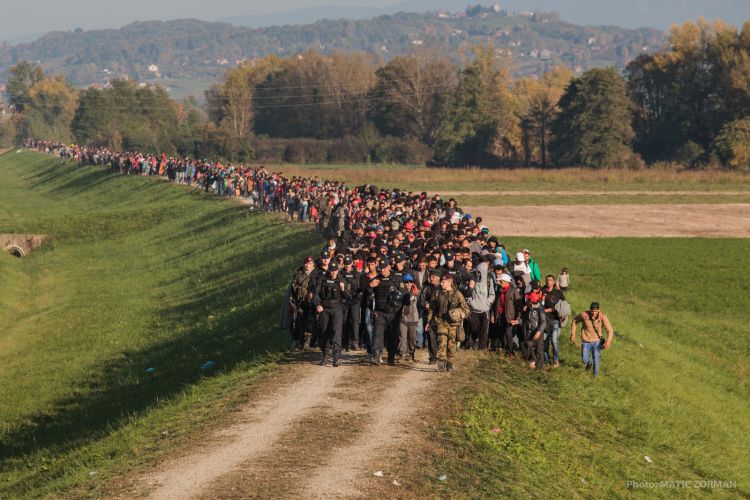 Even during the current period of the intensified migration flows that our country has been facing, the Slovenian Police endeavours to the best of its abilities to guarantee security to its citizens, maintain public order and peace, and secure the property of its inhabitants. This is and will be our priority and, for this purpose, we have mobilised all personnel as well as material and technical means available.
Even during the current period of the intensified migration flows that our country has been facing, the Slovenian Police endeavours to the best of its abilities to guarantee security to its citizens, maintain public order and peace, and secure the property of its inhabitants. This is and will be our priority and, for this purpose, we have mobilised all personnel as well as material and technical means available.
At the same time and in cooperation with all other services (health, civil protection, military, humanitarian organizations and others) that are involved in receiving, dealing with and assisting the migrants, we are trying our best to ensure a decent and humane treatment of the crowds of people passing through the country as far as this is possible, given the exceptional circumstances challenged by a large number and diversity of migrants. Special attention is given to the most vulnerable groups.
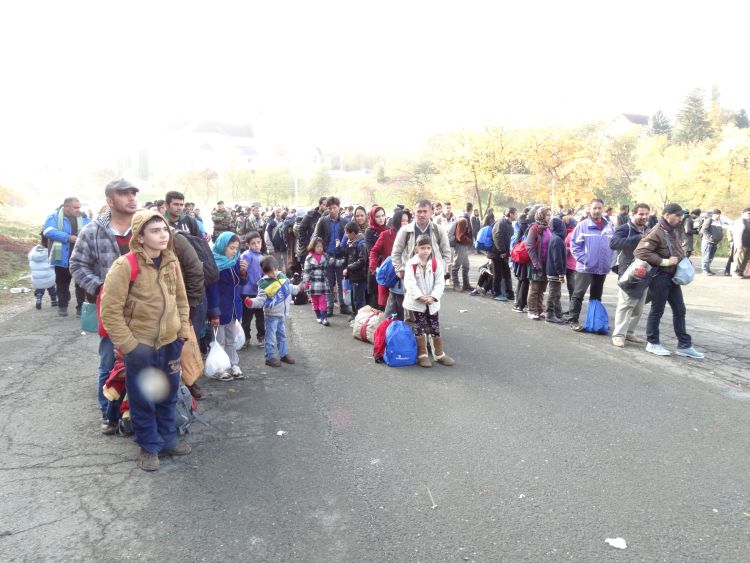 We are also doing our best to ensure that the entrance of migrants is effectively directed, controlled and coordinated with the neighbouring security authorities. Only in this way, we can, in fact, manage the security situation, provide appropriate care to migrants and ensure the safety of both migrants and residents of Slovenia. Unannounced, disorganised and uncontrolled arrivals of large groups of migrants outside the designated entry points are creating significant security and logistics problems since we do not want the migrants to spend hours waiting out in the cold and rain without protection.Our capacities allow to daily receive, in an organised and orderly way, between 2,000 and 2,5000 migrants and new groups can enter only after previous groups leave for Austria.
We are also doing our best to ensure that the entrance of migrants is effectively directed, controlled and coordinated with the neighbouring security authorities. Only in this way, we can, in fact, manage the security situation, provide appropriate care to migrants and ensure the safety of both migrants and residents of Slovenia. Unannounced, disorganised and uncontrolled arrivals of large groups of migrants outside the designated entry points are creating significant security and logistics problems since we do not want the migrants to spend hours waiting out in the cold and rain without protection.Our capacities allow to daily receive, in an organised and orderly way, between 2,000 and 2,5000 migrants and new groups can enter only after previous groups leave for Austria.
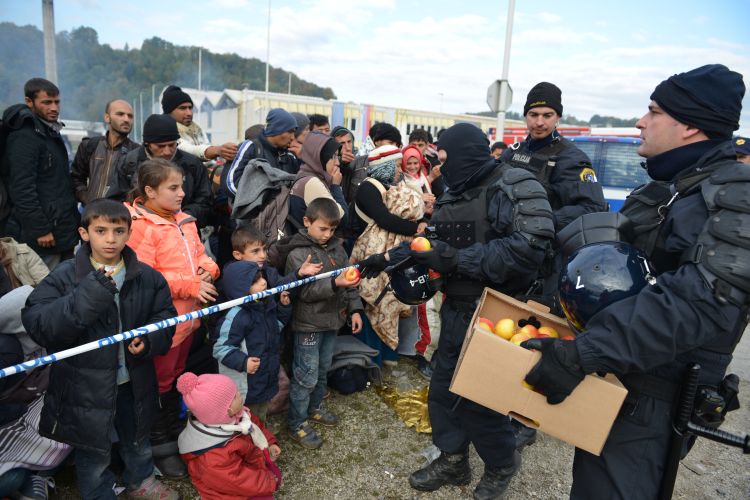 As regards certain questions and allegations that appear in the media about the conditions on the ground and allegedly inappropriate treatment of migrants, we would like to draw the attention to the fact that already upon arrival in Slovenia a large number of migrants are in 'bad shape' since previous countries did not ensure proper care to them. Therefore, they must first be provided with food, clothes, accommodation, and, where needed, medical assistance. We have to understand that, given a huge number of migrants arriving at once and due to our limited capacities, we are not able to guarantee the best conditions for all of them. However, we are endeavouring to do so by putting in maximum efforts. On a daily basis, we are seeking ways to improve the situation on the ground.
As regards certain questions and allegations that appear in the media about the conditions on the ground and allegedly inappropriate treatment of migrants, we would like to draw the attention to the fact that already upon arrival in Slovenia a large number of migrants are in 'bad shape' since previous countries did not ensure proper care to them. Therefore, they must first be provided with food, clothes, accommodation, and, where needed, medical assistance. We have to understand that, given a huge number of migrants arriving at once and due to our limited capacities, we are not able to guarantee the best conditions for all of them. However, we are endeavouring to do so by putting in maximum efforts. On a daily basis, we are seeking ways to improve the situation on the ground.
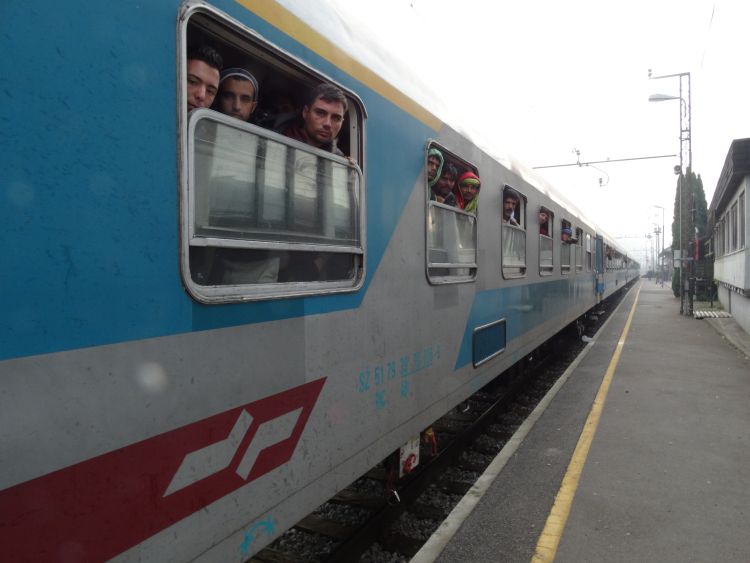 With various solutions and, in cooperation with local communities, the Police and the Ministry of the Interior addresses the problems caused by the arrivals of a large number of migrants to the Slovenian residents of places situated near the border crossings and accommodation and reception centres. Over the last few days, a number of solutions have been put on the table to ease the everyday life of local population, to simplify police work on the ground and disburden other services:
With various solutions and, in cooperation with local communities, the Police and the Ministry of the Interior addresses the problems caused by the arrivals of a large number of migrants to the Slovenian residents of places situated near the border crossings and accommodation and reception centres. Over the last few days, a number of solutions have been put on the table to ease the everyday life of local population, to simplify police work on the ground and disburden other services:
- At Šentilj, an emergency makeshift railway platform will be set up for the arriving migrants to get off the train in the immediate vicinity of the overburdened Šentilj accommodation centre and avoid crossing the settlement itself. When the platform is set up, the road barrier will be lifted - the barrier currently being installed for the migrants to exit the train and continue their way from the railway platform to the accommodation centre;
- at Dobova, an appropriate solution has already been put in place, which has proved to be effective and disburdened Rigonce, i.e. the area of Brežice; namely, the migrants arriving by a Croatian train first undergo the security check at the Dobova railway station, were they also receive medical assistance. Then, they board the Slovenian train and are transferred to accommodations centres, where they undergo the registration procedure;
- with a view to simplifying and speeding up the registration of migrants, some technical improvements have been introduced, such as e-application, which enables fast entry of personal data into the police records; the procedure also includes the taking of fingerprints and photographs. The number of registration points has also been increased.
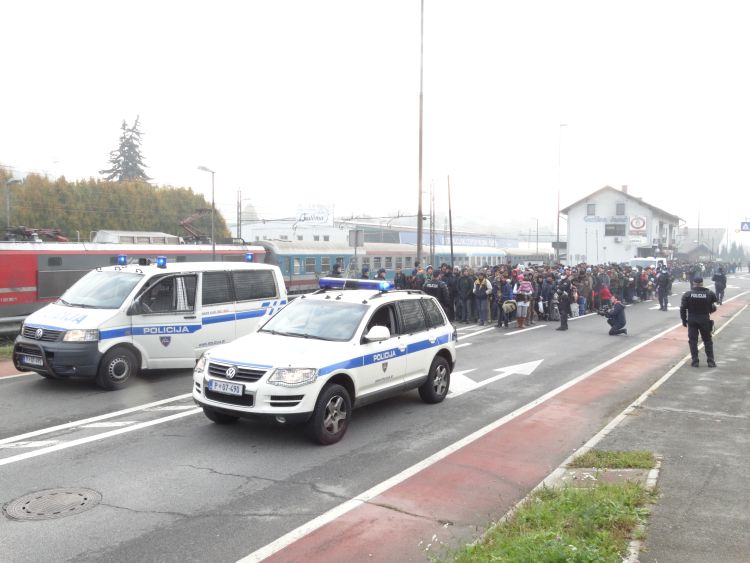 In order to understand better the complexity of the registration procedure, it should be noted that many migrants are coming from the area where the inhabitants only know their year of birth, and not the entire date, since they do not celebrate birthdays; moreover, many of the migrants do not have documents with them and police officers verify their data within the given possibilities. Every foreigner is to first undergo the identification procedure. If a migrant holds a document, the data are entered into the police computer records. If without a document, the data told by the migrant themselves are entered in the registration system. The data are verified through the police records that, for the purpose of protecting the external Schengen border, also undergo the verification through the Schengen Information System. All migrants are photographed and, those older than the age of 16, fingerprinted. Fingerprints taken as part of the application process during the registration are not processed in accordance with the Eurodac Regulation, which applies at the external borders of the European Union. On the basis of the Aliens Act, the migrants are then issued a decision on permission to stay.
In order to understand better the complexity of the registration procedure, it should be noted that many migrants are coming from the area where the inhabitants only know their year of birth, and not the entire date, since they do not celebrate birthdays; moreover, many of the migrants do not have documents with them and police officers verify their data within the given possibilities. Every foreigner is to first undergo the identification procedure. If a migrant holds a document, the data are entered into the police computer records. If without a document, the data told by the migrant themselves are entered in the registration system. The data are verified through the police records that, for the purpose of protecting the external Schengen border, also undergo the verification through the Schengen Information System. All migrants are photographed and, those older than the age of 16, fingerprinted. Fingerprints taken as part of the application process during the registration are not processed in accordance with the Eurodac Regulation, which applies at the external borders of the European Union. On the basis of the Aliens Act, the migrants are then issued a decision on permission to stay.
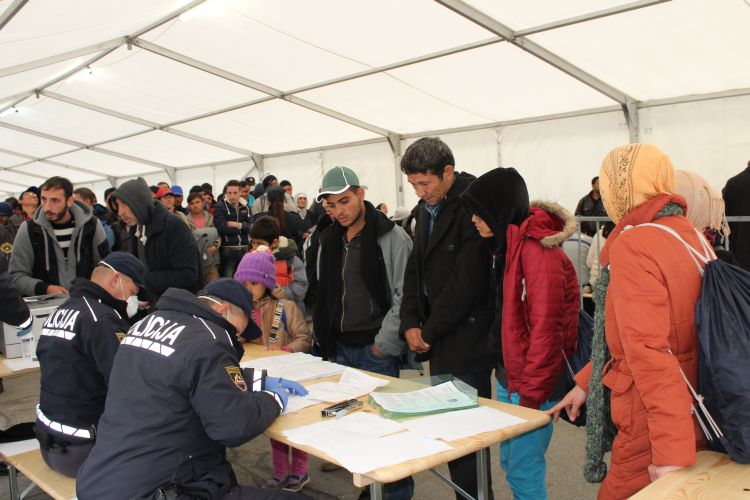 In some exceptional cases (e.g. in the event of an extremely large number of people), the police may carry out a simplified registration procedure, in which the aforementioned data on individuals are collected manually; the data of migrants collected in such a manner are entered into the computer registration system subsequently, without photographs and fingerprints. The procedure for applicants seeking international protection has remained the same.
In some exceptional cases (e.g. in the event of an extremely large number of people), the police may carry out a simplified registration procedure, in which the aforementioned data on individuals are collected manually; the data of migrants collected in such a manner are entered into the computer registration system subsequently, without photographs and fingerprints. The procedure for applicants seeking international protection has remained the same.
As regards the reporting on certain difficulties and delays in the transport of migrants in the interior of the country, it has been established that quite a few such incidents occurred because of the need to provide emergency medical aid to migrants. In some instances, vehicle malfunctions occurred in bus and rail services; last Wednesday afternoon someone on the train allegedly pulled the emergency brake. In all these cases, the migrants continued their journey if the breakdowns were repaired by the same means of transport; if not, we provided other means of transport.
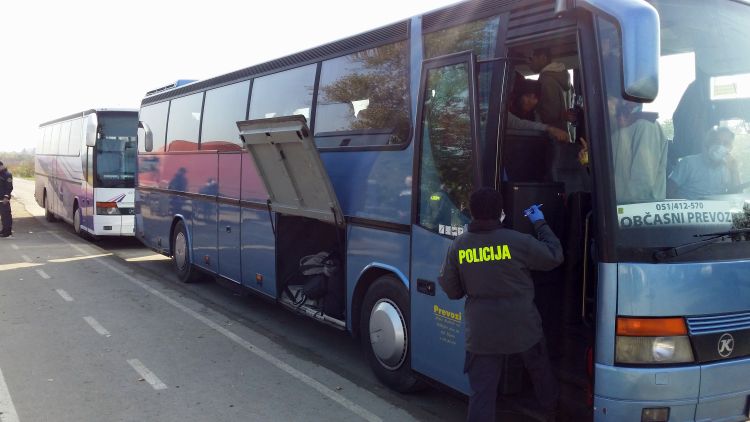 Some foreign media report that there is a shortage of food for migrants, which is not true. We ensure that the migrants, transiting the country, are provided basic supplies, which include temporary accommodation in the reception and accommodation centres and food. The Slovenian Armed Forces prepare cooked meals and deliver them to the reception and accommodation centres daily (for example, on 28 October 2015, they delivered 5,895 cooked meals, 850 kilograms of bread, 970 litres of tea and 130 litres of milk). In addition to hot meals, there are food parcels distributed by the humanitarian organisations - the Red Cross, Caritas, Adra - to the migrants.
Some foreign media report that there is a shortage of food for migrants, which is not true. We ensure that the migrants, transiting the country, are provided basic supplies, which include temporary accommodation in the reception and accommodation centres and food. The Slovenian Armed Forces prepare cooked meals and deliver them to the reception and accommodation centres daily (for example, on 28 October 2015, they delivered 5,895 cooked meals, 850 kilograms of bread, 970 litres of tea and 130 litres of milk). In addition to hot meals, there are food parcels distributed by the humanitarian organisations - the Red Cross, Caritas, Adra - to the migrants.
The migrants, who are housed in the accommodation centres managed by the Civil Protection Service, are allowed to move freely not only inside but also outside these centres. Free movement may only be restricted by the police in exceptional cases for security reasons. All reception centres, which carry out registration procedures and security checks, are subject to special arrangements (also including the restriction of movement).
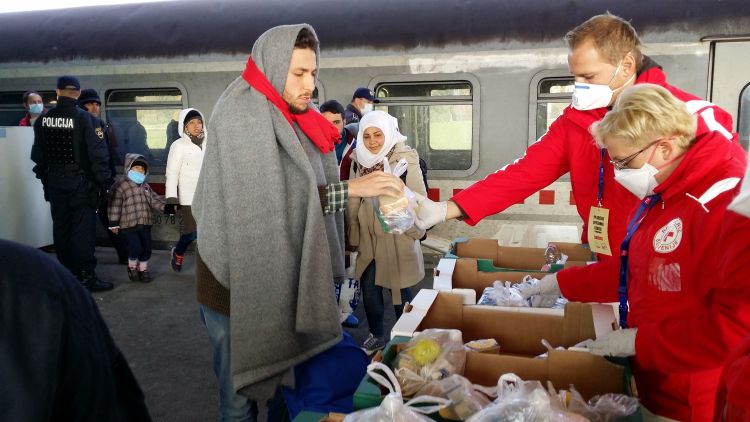 We have also ensured that the migrants get the medical care that is provided by the medical teams in the reception and accommodation centres. This has been organised in cooperation with the health centres from individual regions. The coordination on the ground is in the hands of health centres closest to the reception centres; if necessary, other health centres in the vicinity are set in motion. Representatives of the Slovenian and Hungarian Caritas, volunteer health professionals and Doctors Without Borders are also engaged in providing medical care to the migrants on the ground. The head of a reception centre informs the nearest health centre about the arrival of the migrants. If it is not possible to assemble a medical team of professionals on regular duty or volunteer doctors, such a team is sent to the reception centre by the head of the emergency medical service. All persons who are assessed to urgently need medical help are examined. If there is a suspicion of any contagious disease among the migrants, the Epidemiological Service of the National Public Health Institute is activated. Migrants from the reception centres who are in need of emergency treatment in a healthcare institution are accompanied there by the medical staff.
We have also ensured that the migrants get the medical care that is provided by the medical teams in the reception and accommodation centres. This has been organised in cooperation with the health centres from individual regions. The coordination on the ground is in the hands of health centres closest to the reception centres; if necessary, other health centres in the vicinity are set in motion. Representatives of the Slovenian and Hungarian Caritas, volunteer health professionals and Doctors Without Borders are also engaged in providing medical care to the migrants on the ground. The head of a reception centre informs the nearest health centre about the arrival of the migrants. If it is not possible to assemble a medical team of professionals on regular duty or volunteer doctors, such a team is sent to the reception centre by the head of the emergency medical service. All persons who are assessed to urgently need medical help are examined. If there is a suspicion of any contagious disease among the migrants, the Epidemiological Service of the National Public Health Institute is activated. Migrants from the reception centres who are in need of emergency treatment in a healthcare institution are accompanied there by the medical staff.
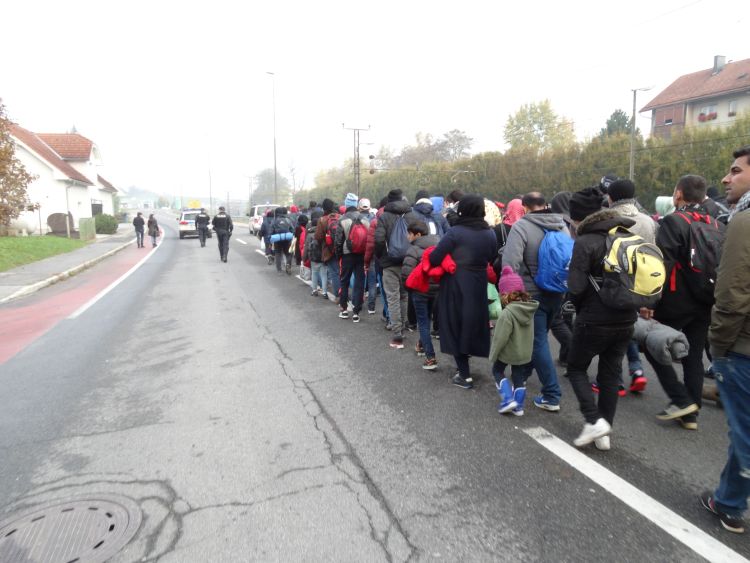 The reason for discrepancies in the statistical data published (considerable differences in the total number of all migrants who entered Slovenia and the total number of those who left the country) lies in the fact that in the first three days we kept no data on the number of migrants accepted by Austria. In addition, some migrants leave the accommodation centres on their own choice and head for Austria. Furthermore, a number of migrants, who are still in transit at the time of reporting, can be unaccounted for in the daily records.
The reason for discrepancies in the statistical data published (considerable differences in the total number of all migrants who entered Slovenia and the total number of those who left the country) lies in the fact that in the first three days we kept no data on the number of migrants accepted by Austria. In addition, some migrants leave the accommodation centres on their own choice and head for Austria. Furthermore, a number of migrants, who are still in transit at the time of reporting, can be unaccounted for in the daily records.
As regards communication with the neighbouring countries, we can say that the Slovenian Police have established a systematic and good exchange of statistical data with Austria and Hungary about the number and location of the migrants in Slovenia. This week, communication with Croatia has considerably improved. Cooperation regarding the announcement of train arrivals has been re-established. Currently, the migrants only enter Slovenia through one entry point, i.e. Dobova. Since the establishment of the aforementioned cooperation, no uncontrolled migration flow has been recorded.
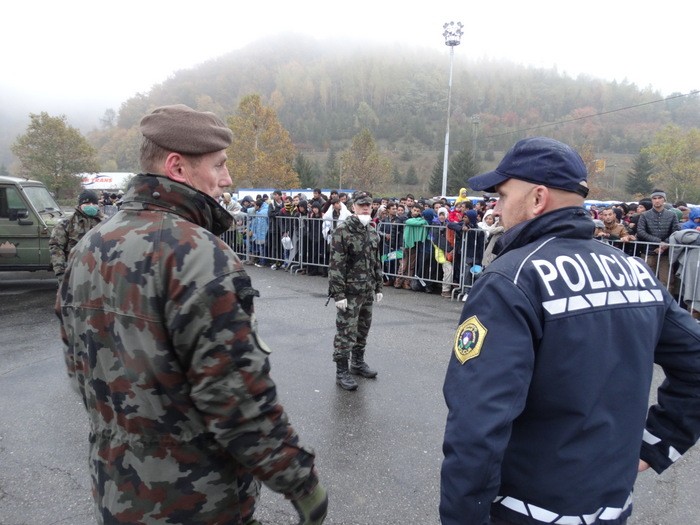 In managing the situation, the help of the volunteers from humanitarian and non-governmental organisations is of vital importance. The Civil Protection Service and the Slovenian Armed Forces provide substantial logistics support to the Slovenian Police. It needs to be clarified that to date engagement of armed forces was limited mainly to support the logistics; the amended Defence Act would, in exceptional cases and subject to the approval by the Parliament, allow the Slovenian Armed Forces to also engage in the protection of the state border. If the amendments to the Defence Act adopted by the Parliament enter into force, the army will be able to carry out some of these tasks (observation, warning, restriction of movement until the arrival of the police, crowd management) in the border area independently and without the police presence, but in line with the police plans.
In managing the situation, the help of the volunteers from humanitarian and non-governmental organisations is of vital importance. The Civil Protection Service and the Slovenian Armed Forces provide substantial logistics support to the Slovenian Police. It needs to be clarified that to date engagement of armed forces was limited mainly to support the logistics; the amended Defence Act would, in exceptional cases and subject to the approval by the Parliament, allow the Slovenian Armed Forces to also engage in the protection of the state border. If the amendments to the Defence Act adopted by the Parliament enter into force, the army will be able to carry out some of these tasks (observation, warning, restriction of movement until the arrival of the police, crowd management) in the border area independently and without the police presence, but in line with the police plans.
We will also table a proposal to amend the Police Organisation and Work Act to provide for an increase in the number of auxiliary police corps. We will also accept the willingness of private security companies regarding the participation of security guards in guarding the accommodation and reception centres.
As of 30 October 2015, the employees of the Slovenian Financial Administration have been engaged in the tasks related to increased migration. Up to 120 employees of the Slovenian Financial Administration in uniforms carry out tasks in accordance with instructions by the police, under their guidance and, of course, in line with their powers envisaged by the Financial Administration Act.
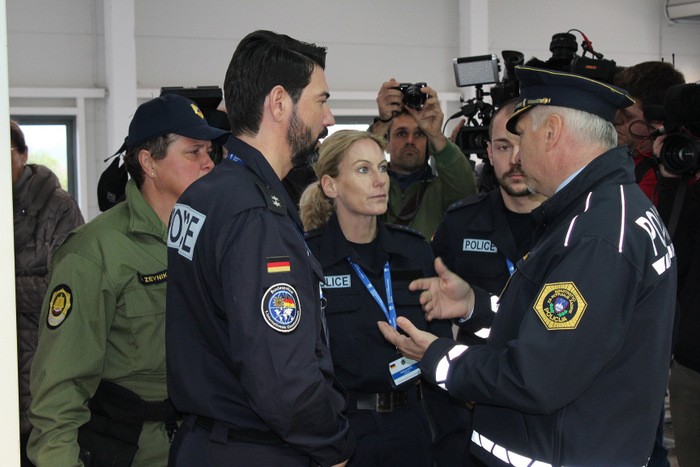 In Slovenia's request regarding the help of foreign police officers, up to this point the following EU member states have responded favourably: Austria, Czech Republic, France, Italy, Hungary, Germany, Slovakia, Lithuania and Spain. Austria deployed its police officers to Slovenia already in mid October. We are currently coordinating arrangements with the Czech Republic, Slovakia, Hungary and Italy; we expect at least 20 police officers from the Czech Republic, 30 from Slovakia and 50 from Hungary. Talks are also underway with France; we have agreed with Lithuania to send 20 police officers. On Wednesday, the first five German police officers arrived to Slovenia and started to work in the Dobova area. Under the bilateral cooperation, the EU member states are expected to send up to 400 police officers to help the Slovenian Police.
In Slovenia's request regarding the help of foreign police officers, up to this point the following EU member states have responded favourably: Austria, Czech Republic, France, Italy, Hungary, Germany, Slovakia, Lithuania and Spain. Austria deployed its police officers to Slovenia already in mid October. We are currently coordinating arrangements with the Czech Republic, Slovakia, Hungary and Italy; we expect at least 20 police officers from the Czech Republic, 30 from Slovakia and 50 from Hungary. Talks are also underway with France; we have agreed with Lithuania to send 20 police officers. On Wednesday, the first five German police officers arrived to Slovenia and started to work in the Dobova area. Under the bilateral cooperation, the EU member states are expected to send up to 400 police officers to help the Slovenian Police.
In conclusion, we have to once again emphasise that up to this point - at this very difficult time for the country facing a mass migration flow - the situation could only be managed thanks to the highly professional and dedicated work and great efforts of all the employees in the Slovenian Police devoted to ensuring the highest level of safety to both population of Slovenia and migrants.
Police Activities in Connection with Current Migration Flows

